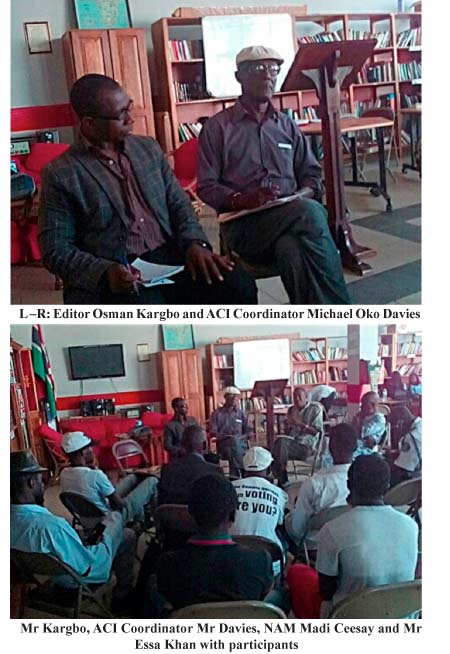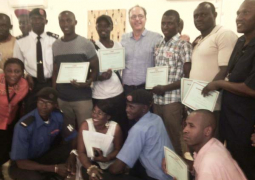
Anti-Corruption
International, The Gambia, on Tuesday held a panel discussion on corruption and
corrupt practices and how to make The Gambia less vulnerable to corruption.
The
seminar, conducted by an anti-corruption expert, Michael Oko Davies, under the
theme ‘’The Risk of Corruption and Corrupt Practices in The Gambia and its
impact on National Development’’, was held at the American Corner on Kairaba
Avenue.
ACI
is a chapter of the international organization based in Benin aimed at
combating corruption in Africa.
Mr
Michael Oko Davies gave a brief history and genesis of corruption citing the
likes of abuse of office, bribery, peddling influence, money laundering,
nepotism, inside trading, speed money/facilitation fees, etc as widespread
instances of corruption in The Gambia.
‘’There
are three forms of corruption: Political Corruption/Grand corruption,
bureaucratic/petty corruption and systematic corruption,” Mr Davies said,
adding that for a person to be termed as corrupt, one must have abused either
his/her grand or petty power.
He
noted that civil society organizations contribute immensely about ninety
percent to the fight against corruption.
Mr
Davies noted that the public forum is the first of many to come as they have
plans to organize more seminars in the future.
Speaking
on the panel discussion, former civil servant and activist, Essa Khan, said
corruption must be minimised to a level it should not hinder the development of
the country.
He
pointed out that issues like weak governance to enforce certain legislative
acts coupled with lack of healthy democracy that promotes freedom of speech and
expression, make it difficult to fight corruption in Africa.
‘’Corruption
is closely tied to governance and development,’’ he said.
Mr
Khan encouraged youths in the country to join hands in the fight against
corruption for the betterment of all and sundry.
For
his part, Madi Ceesay, National Assembly Member for Serrekunda West, and a
member of the National Assembly Panel on Anti-corruption, said such discussions
and forums on corruption and corrupt practices must be encouraged for national
development to take place in The Gambia as it paves the way for the enforcement
of laws that enable the nation to combat corruption.
Mr
Ceesay noted that laws that protect whistle-blowers must be enacted to help in
the fight to expose corruption and corrupt practices for the benefit of all.
For
his part, Osman Kargbo, editor at The Point Newspaper, who also moderated the
seminar, emphasised the importance of the seminar, saying it will enable the
masses of the Gambian people to learn about the different types of corruption
and their impacts as well as the way forward to combat corruption in all its
forms.
Police
Superintendent Sulayman Darboe, one of the participants at the seminar, pointed
out that members of the judiciary, together with the police, are key players in
the fight against corruption in The Gambia. He also said corruption is in every
sector of governance and society hence it must be fought by all and sundry.
The
African Union (AU) in July, 2017 held the inaugural occasion of African
Anti-Corruption Day in Addis Ababa, Ethiopia, dedicated to giving prominence to
the anti-corruption fight on the continent.
The
Assembly of the African Union also declared 2018 as ‘’The African
Anti-Corruption Year’’.
The
Chairperson of the African Union Commission (AUC), H.E. Moussa Faki Mahamat
noted that the African Continent’s fight against corruption marks an important
step towards making Africa the place for all to desire.
The
Gambia is a signatory to the African Union Convention on Preventing and
Combating Corruption (AUCPCC) adopted by the 2nd Ordinary Session of the
Assembly of the Union on 11 July 2003 in Maputo, Mozambique, to which all state
Parties to this Convention are expected to demonstrate their national
legislative and policy instruments aimed at combating corruption.
This
premier anti-corruption seminar organised by Anti-Corruption International, The
Gambia, is in the right direction towards ensuring and sustaining the level of
commitment of combating corruption in The Gambia.



